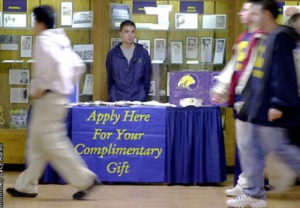 When you’re 18, it’s fair to assume that you know absolutely nothing about anything. What’s inconvenient is that most real knowledge really only comes in hindsight, which is about as useful as a majority of HR Tech ideas being floated in the industry at any given time.
When you’re 18, it’s fair to assume that you know absolutely nothing about anything. What’s inconvenient is that most real knowledge really only comes in hindsight, which is about as useful as a majority of HR Tech ideas being floated in the industry at any given time.
Back in the 1990’s, credit card “pushers” were visible in the student union on nearly every college campus in America. We were living in a time of ‘have fun now, pay later!’ and kids like me were their ideal target audience. We bit hungrily like fish who had been frozen in their parents’ lake of adolescence in suspended animation for 18 years.
Now we had access to our own credit, money, and bills to pay without anyone looking over our shoulders.
In HR Tech, all decisions on day-to-day tools are no longer siloed in the highest reaches of the HR food chain. More and more of these decisions are made at the ground level, by people in active contributor roles. Because of this, you have people who are potentially less versed in these transactions than those who have moved up the food chain.
A fixation all the wrong things
Without hesitation, when I arrived to college and was in front of the credit pushers, I can say I didn’t ask the right questions. Things that seem intuitive today — like balance-transfer rates, APR, and the complexity of the reward structure and blackout dates — evaded any part of my decision making.
You know what I was fixated on? Water bottles, free applications, bonus mileage awards for signing up, and without fail, another new t-shirt. The only people in the world who have marketing down to a better science are the Girl Scouts. Had the Discover reps had Thin Mints and colleges had WiFi, I’m pretty sure I would have never left the student union or my bedroom for any prolonged period of time.
 Yep, all I would have needed were just me, my six credit cards, and my Thin Mints.
Yep, all I would have needed were just me, my six credit cards, and my Thin Mints.
As you can imagine, this college experience didn’t end well. It became a shell game of moving balances from one card to another, without any way to make a discernible difference in the bottom line.
And while some of my miscues are due to some impulsive choices and a fair pinch of youthful stupidity, most of it could have been prevented by me by asking the right questions and not getting distracted by the salesperson’s shiny objects.
Don’t be taken for a ride
HR Tech is at an interesting crossroads right now, where they are as prevalent as the credit card vendor back in my college days. While the game is far more advanced in terms of pitch and technical capabilities, the veritable foundation remains the same. And given where we’ve come in terms of technology, you may not even need to leave your room to get the sales pitch (living the dream…).
However if you don’t ask the right questions, then the likelihood increases exponentially that you’ll be buying some piece of SaaS that you won’t need or use. You’ll blow your budget on shiny objects and be stuck with a pile of HR Tech you can’t do anything with.
If you’re indeed asking the right questions, you reduce the likelihood of being taken on a ride by a mercurial marketing or sales rep who sees you only as the next stop in making their quarterly quota.
4 questions you should be asking about HR Tech solutions
So, here are four (4) simple questions to see if it merits taking a further look:
- Tell me what my company does, as you understand it. How can your technology help us, specifically? If they haven’t done their homework, it’s not worth wasting your time. There is enough information available on companies out there that not having a baseline of knowledge is a non-starter
- Can I see a sample of how this works with MY data? Don’t accept generic data pitches. The data and platform you are seeing during the sales pitch has been curated to work specifically for demos.
- What are the other systems that have worked in conjunction with this technology? And, how do they connect? Beware those that say “We’ll be building an API as part of our product road map.”
- Ask for examples of people who are using the technology they are pitching you right now. But in addition to the references the company gives you, find some of your own and do your own vetting so you can form an unbiased opinion.
 No space is flooded quite like the HR Tech space is at this current moment with it’s wide-array of “disruptive” solutions. It’s easy to get lost in the shimmer of the list of the “major” clients that use this tool.
No space is flooded quite like the HR Tech space is at this current moment with it’s wide-array of “disruptive” solutions. It’s easy to get lost in the shimmer of the list of the “major” clients that use this tool.
I’ve lost count of how many times I’ve heard “oh well, Apple and Microsoft have it, so it must be good if they are using it.” That’s just flawed logic. They may indeed be using it, and loving it (or not), but they got it because they LITERALLY have the money to burn on it.
However, most companies don’t have hundreds of billions in cash sitting in the [offshore] bank, so they have to be more frugal with their budget.
Educate yourself, and rely on your colleagues to help provide insight that most certainly won’t be available in a sales pitch. You’ll save time and money. And after all, that’s the Holy Grail of HR, isn’t it?
Authors
Pete Radloff
Pete Radloff is a veteran recruiter, sourcer and consultant, who has been in the industry since 2000, with experience in both agency and corporate settings. Pete’s passion stretches across several areas of talent acquisition, including recruitment and sourcing, social media, employment branding, recruitment operations and the training and mentoring of recruiters. Currently the Principal Technical Recruiter for comScore, and a Lead Consultant with exaqueo, Pete has previously worked for high-growth organizations such as NPR and LivingSocial. In addition to recruiting top talent both in the U.S. and abroad for these companies, Pete has developed successful recruitment and sourcing frameworks, recruitment processes and procedures, and enhancements to the candidate experience to enhance employer brand. Being part of the local recruiting community in Washington, D.C. has always been important to Pete. He was a member of Board of Directors for recruitDC since for six (6) years, and has also been a speaker at several recruitDC events. He's also a contributing writer at RecruitingDaily and SourceCon. You can find him on LinkedIn and Twitter, or at his site, RecruitingIn3D
Recruit Smarter
Weekly news and industry insights delivered straight to your inbox.





